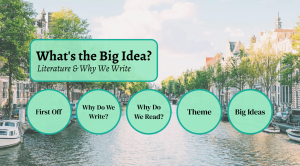1 Why We Write
Learning Objectives
-
Explore literature as a medium for meaningful conversation and an expression of human empathy.
-
Use metacognitive reading strategies before, during and after reading fiction, non-fiction and graphics.
Chapter & Discussion
This chapter includes a presentation that can be navigated in a classroom setting or independently. You can access the presentation via the link below.
What’s the Big Idea: Literature & Why We Write
Work through the different sections of the chapter and discuss ideas and topics as they arise. If you’re working independently, take notes instead. Notes and active discussion will be helpful in navigating this week’s assignments.
First Off
You matter. Your thoughts and ideas, perspectives, wisdom, and worldviews are unique; and every one of them matters. I think this is an important place to start thinking about literature.
One of the activities humans enjoy most is conversation, where we share our ideas (and perspectives, wisdom, and worldviews) with others and learn about theirs.
Conversation is where we connect with other people, where we express our personalities, and where we form relationships.
Usually, when we use the word literature, we’re referring to narratives (stories) in written form.
These stories are a conversation between the author and the reader. They are a great way of sharing ideas. They are a venue for the author’s perspectives, wisdom, and worldviews.

Why Do We Write?
Or create anything for that matter?
We write because we have something to say.
Our writing is a vehicle for transmitting our ideas. All people are unique. We have unique perspectives, wisdom to share, and a unique way we see the world. When we write, this shows up in our writing.
Why do we read?
Reading is an expression of empathy. It asks us to consider someone else’s ideas and perspectives in the context of a setting, characters, and circumstances that are foreign to us.
When we read, we connect with another person and consider how we might behave if we faced the circumstances of the story.

Theme
A theme is a big idea that an author is trying to share by telling this story. Stories usually have multiple themes.
Or, in short, the theme is the thing that the author has to say.
In literature, authors are usually indirect when communicating themes. To do this, they use tools like:
- Metaphors
- Foreshadowing
- Motifs
Why do you think authors like to be indirect when sharing their main ideas?
Theme vs Topic.
Writers explore all kinds of topics when they write, such as love, growing up, or revenge.
A theme is what the author has to say about a topic. Give an example of a possible theme based on one of the above topics.
Big Ideas: Why We Write
- Reading is a conversation, an expression of empathy, and a chance to connect with another person
- We write because we have something to say. That thing is called a theme.
- Figuring out an author’s themes is supposed to be fun.
- Your ideas matter! I want to hear them and help you express them in writing.
Assigned Reading
Here are this week’s readings. Additionally, please read for your own personal enjoyment for 1/2 hour each day. This will be called your “Reading Zone” reading and it will coincide with many upcoming activities.
How and Why We Read by John Green (via Crash Course)
Practice Set: Why We Write
Click here to complete a practice set that explores concepts from the chapter.
These practice sets are designed to resemble the types of questions you’ll encounter on the GED RLA test. In this case, I am including a full novel chapter so that the reading can be engaging and so that you can have meaningful practice in the skill of close reading.
All of the practice sets in the Literature Unit will take on this format so that you can engage in enough practice to level up your reading skills while having access to literature that’s worth your time.
Assignment: How and Why We Read (250 Words)
Watch “How and Why We Read” by John Green (Author of The Fault in Our Stars). Create a written response to the video that addresses the following prompts:
-
Name one of your favorite stories (this can be a book, a play, a film, a television show, etc). What do you like about it? Why do you think this story speaks to you?
-
According to John Green, what is one of the main reasons we read? Do you agree with him? Explain.
-
According to John Green, what is a benefit of reading more critically? What are your thoughts on this?
Assignment: Reading Zone Response (250 Words)
For Reading Zone, you must find a novel that is interesting to you and enjoyable to read. If you need help finding a Reading Zone book, please ask. Please read your Reading Zone book for a half-hour each day. On class days, there will be time in class dedicated to reading.
Create a response to this week’s reading that addresses the following prompts:
-
In one paragraph, summarize what you’ve read this week
-
In a second paragraph, describe the setting, characters, and one theme that you have noticed.


